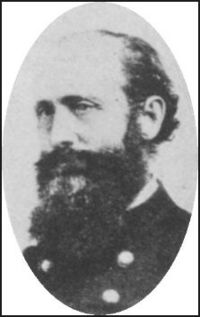Conrad Feger Jackson facts for kids
Quick facts for kids
Conrad Feger Jackson
|
|
|---|---|
 |
|
| Born | September 11, 1813 Alsace Township, Pennsylvania |
| Died | December 13, 1862 (aged 49) Fredericksburg, Virginia |
| Place of burial |
Allegheny Cemetery, Pittsburgh, Pennsylvania
|
| Allegiance | United States of America Union |
| Service/ |
United States Army Union Army |
| Years of service | 1861–1862 |
| Rank | |
| Unit | Army of the Potomac |
| Commands held | 3rd Brigade, Pennsylvania Reserves |
| Battles/wars | American Civil War |
Conrad Feger Jackson (born September 11, 1813 – died December 13, 1862) was a businessman and soldier from Pennsylvania. He became a brigadier general in the Union Army during the American Civil War. He sadly died in battle at the Battle of Fredericksburg.
Early Life and Work
Jackson was born in Alsace Township in Berks County, Pennsylvania. His family were Quakers, a religious group known for peace. However, his father, Isaac Jackson, joined the United States Army during the War of 1812. He died six years later from an illness he got while serving.
After his father passed away, young Jackson moved to live with an uncle in Chester County. He went to Quaker schools there. When he was older, he worked in a warehouse in Philadelphia. Later, he became a conductor on the Philadelphia and Reading Railroad.
In 1845, President James K. Polk chose him to be a lieutenant in the revenue service. This meant he helped collect taxes and fees for the government. He was then sent to Mexico to deliver important messages to General Winfield Scott during the Mexican–American War.
After the war, Jackson went back to Pennsylvania and settled in Pittsburgh. He was active in a local militia group, which was like a local army. In the late 1850s, he managed an oil company in the Kanawha Valley area of western Virginia.
Serving in the Civil War
When Virginia left the United States in early 1861, Jackson quickly quit his job. He returned to Pennsylvania and helped create a new army unit. This unit became the 9th Pennsylvania Reserve Regiment and was formed in the Pittsburgh area. Governor Andrew G. Curtin made him its colonel, which is a high-ranking officer.
Jackson fought well during the 1862 Peninsula Campaign. He was praised for his bravery. On July 17, he was promoted to brigadier general. This meant he was now in charge of the 3rd Brigade of the Pennsylvania Reserves.
He then led his brigade in the Northern Virginia campaign at the Second Battle of Bull Run. Later that year, he fought in the Maryland Campaign. He took part in the battles of South Mountain and Antietam.
At the Battle of Fredericksburg in December, General Jackson led his brigade forward. They were moving towards the right side of the Confederate army. His division commander, General George Meade, later wrote about what happened:
The Third brigade had not advanced over one hundred yards when the battery on the height on its left was re-manned, and poured a destructive fire into its ranks. Perceiving this, I dispatched my Aide-de-camp, Lieutenant Dehon, with orders for General Jackson to move by the right flank till he could clear the open ground in front of the battery, and then, ascending the height through the woods, sweep round to the left and take the battery. Unfortunately Lieutenant Dehon fell just as he reached General Jackson, and a short time after, the latter officer was killed. The regiments did, however, partially execute the movement by obliquing to the right, and advanced across the railroad, a portion ascending the heights in their front. The loss of their commander, and the severity of the fire, from both artillery and infantry, to which they were subjected, compelled them to withdraw."
General Jackson had ridden ahead to give an important order. But before he could give it, he was hit in the head by shots from the Confederate side. His aide, a helper who carried messages, was also killed. General Meade wrote that Jackson's death was a great loss. He said Jackson was a good officer who earned his rank because of his bravery in earlier battles.
Jackson's body was taken from the battlefield three days after he died. It was brought back to Pittsburgh for his funeral. He was buried in the Allegheny Cemetery in Pittsburgh.
Fort Jones in Pittsburgh was sometimes called Fort Jackson to honor him. However, its name was never officially changed.
 | Shirley Ann Jackson |
 | Garett Morgan |
 | J. Ernest Wilkins Jr. |
 | Elijah McCoy |

